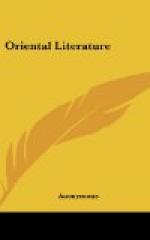[9] Yezid succeeded Mowiah in the Caliphate
A.H. 60; and in most
respects showed himself
to be of a very different disposition from
his predecessor.
He was naturally cruel, avaricious, and debauched;
but instead of concealing
his vices from the eyes of his subjects,
he seemed to make a
parade of those actions which he knew no good
Mussulman could look
upon without horror; he drank wine in public,
he caressed his dogs,
and was waited upon by his eunuchs in sight
of the whole court.
ON FATALISM[10]
Not always wealth, not always force
A splendid destiny commands;
The lordly vulture gnaws the corse
That rots upon yon barren
sands.
Nor want, nor weakness still conspires
To bind us to a sordid state;
The fly that with a touch expires
Sips honey from the royal
plate.
Imam Shafay Mohammed Ben Idris.
[10] Shafay, the founder of one of the four orthodox
sects into
which the Mohammedans
are divided, was a disciple of Malek Ben
Ans, and master to Ahmed
Ebn Hanbal; each of whom, like himself,
founded a sect which
is still denominated from the name of its
author. The fourth
sect is that of Abou Hanifah. This differs
in tenets considerably
from the three others, for whilst the
Malekites, the Shafaites,
and the Hanbalites are invariably
bigoted to tradition
in their interpretations of the Koran, the
Hanifites consider themselves
as at liberty in any difficulty to
make use of their own
reason.
TO THE CALIPH HARUN-AL-RASHID[11]
Religion’s gems can ne’er
adorn
The flimsy robe by pleasure worn;
Its feeble texture soon would tear,
And give those jewels to the air.
Thrice happy they who seek th’ abode
Of peace and pleasure, in their God!
Who spurn the world, its joys despise,
And grasp at bliss beyond the skies.
Ibrahim Ben Adham.
[11] The author of this poem was a hermit of Syria,
equally celebrated
for his talents and
piety. He was son to a prince of Khorasan, and
born about the ninety-seventh
year of the Hegira. This poem was
addressed to the Caliph
upon his undertaking a pilgrimage to Mecca.
LINES TO HARUN AND YAHIA[12]
Th’ affrighted sun ere while he
fled,
And hid his radiant face in night;
A cheerless gloom the world overspread—
But Harun came, and all was bright.
Again the sun shoots forth his rays,
Nature is deck’d in beauty’s
robe—
For mighty Harun’s sceptre sways,
And Yahia’s arm sustains the globe.
Isaac Almousely.
[12] Isaac Almousely is considered by the Orientals
as the most
celebrated musician
that ever flourished in the world. He was born
in Persia, but having
resided almost entirely at Mousel, he is
generally supposed to
have been a native of that place.




